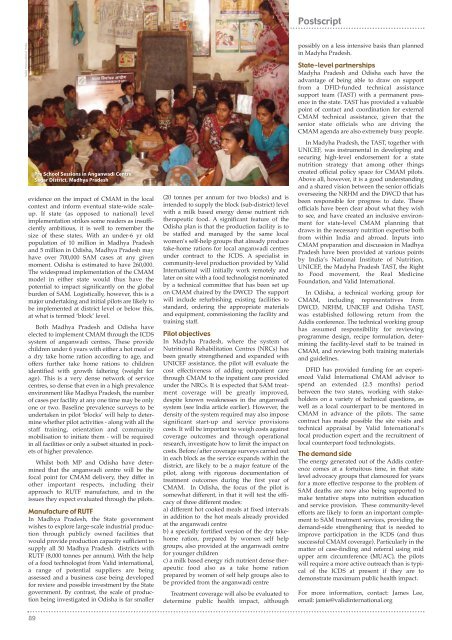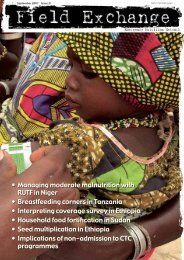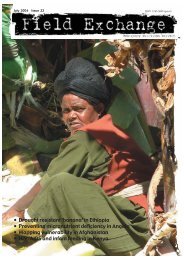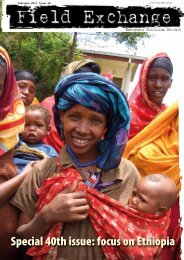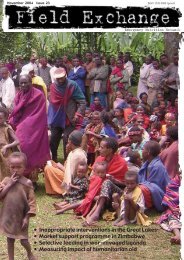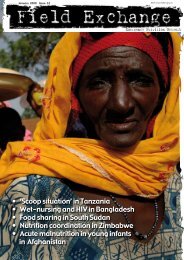Download a PDF of this issue - Field Exchange - Emergency ...
Download a PDF of this issue - Field Exchange - Emergency ...
Download a PDF of this issue - Field Exchange - Emergency ...
You also want an ePaper? Increase the reach of your titles
YUMPU automatically turns print PDFs into web optimized ePapers that Google loves.
Postscript<br />
Valid International, India<br />
Pre School Sessions in Anganwadi Centre,<br />
Sagar District, Madhya Pradesh<br />
evidence on the impact <strong>of</strong> CMAM in the local<br />
context and inform eventual state-wide scaleup.<br />
If state (as opposed to national) level<br />
implementation strikes some readers as insufficiently<br />
ambitious, it is well to remember the<br />
size <strong>of</strong> these states. With an under-6 yr old<br />
population <strong>of</strong> 10 million in Madhya Pradesh<br />
and 5 million in Odisha, Madhya Pradesh may<br />
have over 700,000 SAM cases at any given<br />
moment. Odisha is estimated to have 260,000.<br />
The widespread implementation <strong>of</strong> the CMAM<br />
model in either state would thus have the<br />
potential to impact significantly on the global<br />
burden <strong>of</strong> SAM. Logistically, however, <strong>this</strong> is a<br />
major undertaking and initial pilots are likely to<br />
be implemented at district level or below <strong>this</strong>,<br />
at what is termed ‘block’ level.<br />
Both Madhya Pradesh and Odisha have<br />
elected to implement CMAM through the ICDS<br />
system <strong>of</strong> anganwadi centres. These provide<br />
children under 6 years with either a hot meal or<br />
a dry take home ration according to age, and<br />
<strong>of</strong>fers further take home rations to children<br />
identified with growth faltering (weight for<br />
age). This is a very dense network <strong>of</strong> service<br />
centres, so dense that even in a high prevalence<br />
environment like Madhya Pradesh, the number<br />
<strong>of</strong> cases per facility at any one time may be only<br />
one or two. Baseline prevalence surveys to be<br />
undertaken in pilot ‘blocks’ will help to determine<br />
whether pilot activities - along with all the<br />
staff training, orientation and community<br />
mobilisation to initiate them - will be required<br />
in all facilities or only a subset situated in pockets<br />
<strong>of</strong> higher prevalence.<br />
Whilst both MP and Odisha have determined<br />
that the anganwadi centre will be the<br />
focal point for CMAM delivery, they differ in<br />
other important respects, including their<br />
approach to RUTF manufacture, and in the<br />
<strong>issue</strong>s they expect evaluated through the pilots.<br />
Manufacture <strong>of</strong> RUTF<br />
In Madhya Pradesh, the State government<br />
wishes to explore large-scale industrial production<br />
through publicly owned facilities that<br />
would provide production capacity sufficient to<br />
supply all 50 Madhya Pradesh districts with<br />
RUTF (8,000 tonnes per annum). With the help<br />
<strong>of</strong> a food technologist from Valid international,<br />
a range <strong>of</strong> potential suppliers are being<br />
assessed and a business case being developed<br />
for review and possible investment by the State<br />
government. By contrast, the scale <strong>of</strong> production<br />
being investigated in Odisha is far smaller<br />
(20 tonnes per annum for two blocks) and is<br />
intended to supply the block (sub-district) level<br />
with a milk based energy dense nutrient rich<br />
therapeutic food. A significant feature <strong>of</strong> the<br />
Odisha plan is that the production facility is to<br />
be staffed and managed by the same local<br />
women’s self-help groups that already produce<br />
take-home rations for local anganwadi centres<br />
under contract to the ICDS. A specialist in<br />
community-level production provided by Valid<br />
International will initially work remotely and<br />
later on site with a food technologist nominated<br />
by a technical committee that has been set up<br />
on CMAM chaired by the DWCD The support<br />
will include refurbishing existing facilities to<br />
standard, ordering the appropriate materials<br />
and equipment, commissioning the facility and<br />
training staff.<br />
Pilot objectives<br />
In Madyha Pradesh, where the system <strong>of</strong><br />
Nutritional Rehabilitation Centres (NRCs) has<br />
been greatly strengthened and expanded with<br />
UNICEF assistance, the pilot will evaluate the<br />
cost effectiveness <strong>of</strong> adding outpatient care<br />
through CMAM to the inpatient care provided<br />
under the NRCs. It is expected that SAM treatment<br />
coverage will be greatly improved,<br />
despite known weaknesses in the anganwadi<br />
system (see India article earlier). However, the<br />
density <strong>of</strong> the system required may also impose<br />
significant start-up and service provisions<br />
costs. It will be important to weigh costs against<br />
coverage outcomes and through operational<br />
research, investigate how to limit the impact on<br />
costs. Before/after coverage surveys carried out<br />
in each block as the service expands within the<br />
district, are likely to be a major feature <strong>of</strong> the<br />
pilot, along with rigorous documentation <strong>of</strong><br />
treatment outcomes during the first year <strong>of</strong><br />
CMAM. In Odisha, the focus <strong>of</strong> the pilot is<br />
somewhat different, in that it will test the efficacy<br />
<strong>of</strong> three different modes:<br />
a) different hot cooked meals at fixed intervals<br />
in addition to the hot meals already provided<br />
at the anganwadi centre<br />
b) a specially fortified version <strong>of</strong> the dry takehome<br />
ration, prepared by women self help<br />
groups, also provided at the anganwadi centre<br />
for younger children<br />
c) a milk based energy rich nutrient dense therapeutic<br />
food also as a take home ration<br />
prepared by women <strong>of</strong> self help groups also to<br />
be provided from the anganwadi centre<br />
Treatment coverage will also be evaluated to<br />
determine public health impact, although<br />
possibly on a less intensive basis than planned<br />
in Madyha Pradesh.<br />
State-level partnerships<br />
Madyha Pradesh and Odisha each have the<br />
advantage <strong>of</strong> being able to draw on support<br />
from a DFID-funded technical assistance<br />
support team (TAST) with a permanent presence<br />
in the state. TAST has provided a valuable<br />
point <strong>of</strong> contact and coordination for external<br />
CMAM technical assistance, given that the<br />
senior state <strong>of</strong>ficials who are driving the<br />
CMAM agenda are also extremely busy people.<br />
In Madyha Pradesh, the TAST, together with<br />
UNICEF, was instrumental in developing and<br />
securing high-level endorsement for a state<br />
nutrition strategy that among other things<br />
created <strong>of</strong>ficial policy space for CMAM pilots.<br />
Above all, however, it is a good understanding<br />
and a shared vision between the senior <strong>of</strong>ficials<br />
overseeing the NRHM and the DWCD that has<br />
been responsible for progress to date. These<br />
<strong>of</strong>ficials have been clear about what they wish<br />
to see, and have created an inclusive environment<br />
for state-level CMAM planning that<br />
draws in the necessary nutrition expertise both<br />
from within India and abroad. Inputs into<br />
CMAM preparation and discussion in Madhya<br />
Pradesh have been provided at various points<br />
by India’s National Institute <strong>of</strong> Nutrition,<br />
UNICEF, the Madyha Pradesh TAST, the Right<br />
to Food movement, the Real Medicine<br />
Foundation, and Valid International.<br />
In Odisha, a technical working group for<br />
CMAM, including representatives from<br />
DWCD, NRHM, UNICEF and Odisha TAST,<br />
was established following return from the<br />
Addis conference. The technical working group<br />
has assumed responsibility for reviewing<br />
programme design, recipe formulation, determining<br />
the facility-level staff to be trained in<br />
CMAM, and reviewing both training materials<br />
and guidelines.<br />
DFID has provided funding for an experienced<br />
Valid International CMAM advisor to<br />
spend an extended (2.5 months) period<br />
between the two states, working with stakeholders<br />
on a variety <strong>of</strong> technical questions, as<br />
well as a local counterpart to be mentored in<br />
CMAM in advance <strong>of</strong> the pilots. The same<br />
contract has made possible the site visits and<br />
technical appraisal by Valid International’s<br />
local production expert and the recruitment <strong>of</strong><br />
local counterpart food technologists.<br />
The demand side<br />
The energy generated out <strong>of</strong> the Addis conference<br />
comes at a fortuitous time, in that state<br />
level advocacy groups that clamoured for years<br />
for a more effective response to the problem <strong>of</strong><br />
SAM deaths are now also being supported to<br />
make tentative steps into nutrition education<br />
and service provision. These community-level<br />
efforts are likely to form an important complement<br />
to SAM treatment services, providing the<br />
demand-side strengthening that is needed to<br />
improve participation in the ICDS (and thus<br />
successful CMAM coverage). Particularly in the<br />
matter <strong>of</strong> case-finding and referral using mid<br />
upper arm circumference (MUAC), the pilots<br />
will require a more active outreach than is typical<br />
<strong>of</strong> the ICDS at present if they are to<br />
demonstrate maximum public health impact.<br />
For more information, contact: James Lee,<br />
email: jamie@validinternational.org<br />
89


